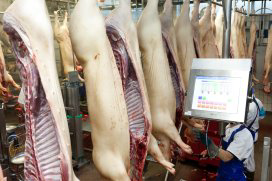US pork organisations protest against COOL

The US National Pork Producers Council (NPPC) as well as 34 US state pork producer organisations have urged the US Senate to take up legislation to repeal Country of Origin Labelling (COOL) requirements for beef, pork and poultry.
The organisations continue to push their message into US Congress as it takes a month-long recess beginning in early August.
Country of Origin Labelling
The US Country of Origin Labelling (COOL) law requires meat to be labelled with the country where the animal from which it was derived was born, raised and harvested.
Last May, the World Trade Organization (WTO) in May rejected an appeal by the United States of the international trade body’s October 2014 ruling that the COOL provisions on beef and pork discriminate against Canadian and Mexican animals, which they send to the
United States to be fed out and processed.
The United States pork industry sees its own business damaged, pointing to one effect of the law allowing Canada and Mexico to place what the US organisations call ‘retaliatory tariffs’ on US goods going into their countries.
Letter sent to every member of US senate
In a letter sent today to every member of the Senate, NPPC and the state pork associations urged lawmakers “to introduce and pass legislation to repeal country of origin labeling requirements for pork, beef and poultry before the August recess. Without swift repeal, the Congress will imperil US exports and jobs.”
Canada has asked the WTO to authorise $3 billion (Canadian dollars, or about $2.4 billion US dollars) a year in retaliatory tariffs against US imports, and Mexico is seeking $713 million in retaliation.
Making COOL voluntary
Some senators have suggested making COOL voluntary, a proposal dismissed by the pork groups. The organisations stated, “At this point, if Congress were to change the labelling law, the WTO would not review such changes. The only thing left for the WTO to do in the case is to determine the level of retaliation that Canada and Mexico can extract from the United States, whose day in court is over.”











